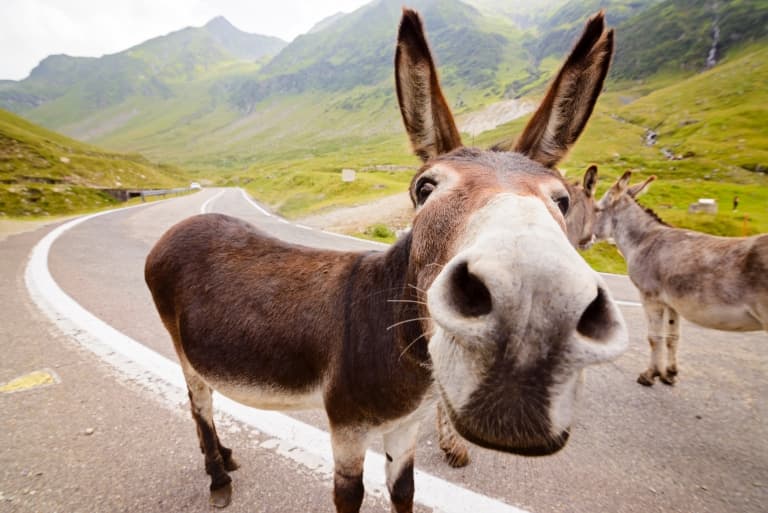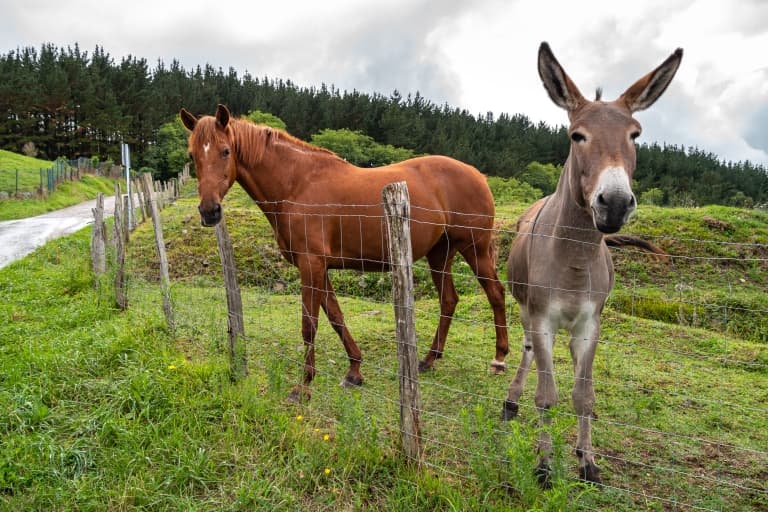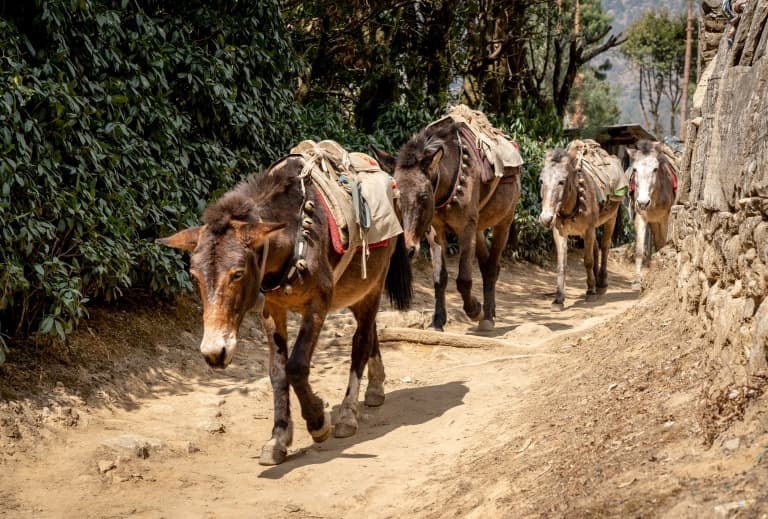Donkeys are OG badasses. They’re tough, they’re smart and they’re not as prissy and high maintenance as a horse.
Horses will go to great lengths to kill themselves and anyone around them if they’re the slightest bit spooked. They’re picky eaters, they need to get their hair and nails done routinely, and they are generally as thick as two short planks. But they are very strong and tend to be easy to persuade with food.
On the other hand, the only real limitation of a donkey is its relatively smaller stature.
So, some clever old folks wondered if they could take the leggy build and incredible strength of a horse and put it into something with a bit more brains and a better attitude: a donkey.
The result was a mule, and it became one of the most significant animals to human development since the mosquito. But this time, in a good way.

Mules are a lot like donkeys, but different. Here’s how.
1. Donkeys make mules
To make a mule, you need one part donkey and one part horse. But you have to combine them in the right order.
If you’re lucky enough to be able to fit the uncomfortable bulk of a stallion’s Kraken into the back end of a poor Jenny you might well end up with a hybrid, but it won’t be a mule; this would be a Hinny.
Hinnies are much rarer and cool in their own right, but they’re not what we’re looking for – we want a mule.
Flip the sexes and you’ve got a much more lubricated fit between a moderate donkey organ and the superior accommodation of the mare’s ample cavity. From this pairing, if anything but embarrassment comes of it, you get a mule.
So, donkeys (and horses) make mules. Mules can’t make donkeys, though, because – in strict scientific terms – their chromosomes are all wonky.

2. Mules are infertile
The offspring of a hybridisation event like this is very often sterile. This is true as a general rule when the parents are from two different species. In fact, one of the loose definitions of a species is an animal that can make fertile offspring with another of its kind.
Horses and donkeys are so different in their genetic makeup that they don’t even share the same number of chromosomes. The horse has 64, the donkey only has 62. The mule splits the difference and receives 63 chromosomes, which makes it impossible to find a pair (something chromosomes prefer to do) when mating, and ultimately renders the owner sterile.
Donkeys, as you may have figured from all the horse-impregnating they’ve been doing, are not inherently infertile.
3. Mules are bigger
Mules also seem to split the difference in terms of size. They’re not as big as the mare that birthed them but they’re larger than their donkey fathers.
That’s one of the key points of breeding them in the first place, because, while the donkey is exceptionally strong, pound for pound, the mule brings a lot more pounds to the table. 1
4. Mules are stronger
Wild donkeys weigh around 250kg if they’re a good size. Domesticated ones weigh around the same, and mammoth breeds are a lot bigger. A decent-sized mammoth donkey might weigh somewhere around 400kg if he’s a big beast.
A large mule can reach 700kg, and they bring with them the same sort of brute force that donkeys are well known for.
So, being that much heavier, they can carry a significant amount more than the poor little donkey. 2

5. Mules might be smarter
If you take one smart animal and breed it with one stupid animal, it’s possible you’ll get a product somewhere in between when it comes to brain power.
But it’s also possible you’ll get something that’s smarter than the sum of its parts. This is called hybrid vigour, and it’s a strange phenomenon but one that’s scientifically backed, though it’s not something that is guaranteed in hybrids, by any means.
Mules certainly far surpass horses in their ability to stay calm when there’s a moth somewhere around them but much of that comes from the donkey genes.
Donkeys are ferociously intelligent animals, but this brings an air of stubbornness with it. People say mules are smarter than donkeys, but that’s got a lot to do with the fact that they’re less stubborn. Unfortunately for people, the opposite of stubborn is not smart – ask any pig. Donkeys (and pigs) are stubborn because they’re smart.
Still, it’s said that a mule is smarter than both its parents. Whether this is true or not is debatable. 3
6. Mules are less stubborn
Mules, on the other hand, are a lot easier to work with and they’re generally even easier to train than a donkey.
They get some malleability from the horse while maintaining the smarts and situational awareness of the donkey.

7. Donkeys don’t get puns thrown at them by bartenders
A lot of the facial features of the mule are inherited from the horse.
Mules have longer heads than donkeys, and you can clearly see the horse genes in there when comparing them to donkeys.
But this stops at the ears, which are distinctly donkey-like, further accentuating the length of this animal’s face and making it a prime candidate for classic jokes, especially because the hose would trip over a bar stool and go on a terrified rampage, breaking all its legs before it reached the bar.

Final thoughts
So there you have it – donkeys versus mules!
Mules exhibit the best of both worlds. They have more size and therefore strength than the humble donkey, having taken those traits from the mother. From their donkey father, they take the smarts, toughness and disinclination to make a fuss. They’re bigger than donkeys but won’t flee if they see a cloud they don’t like.
So, what you’re left with is a large donkey with a horse face and (debatably) more smarts than either of them.
The best way to tell them apart is to compare their bodies to their faces. Mules have quite plump, donkey-like figures. They also have long, donkey-like ears. But the face is distinctly horse-like.
If that fails, try to breed with it. If you’re successful, it’s not a mule.
